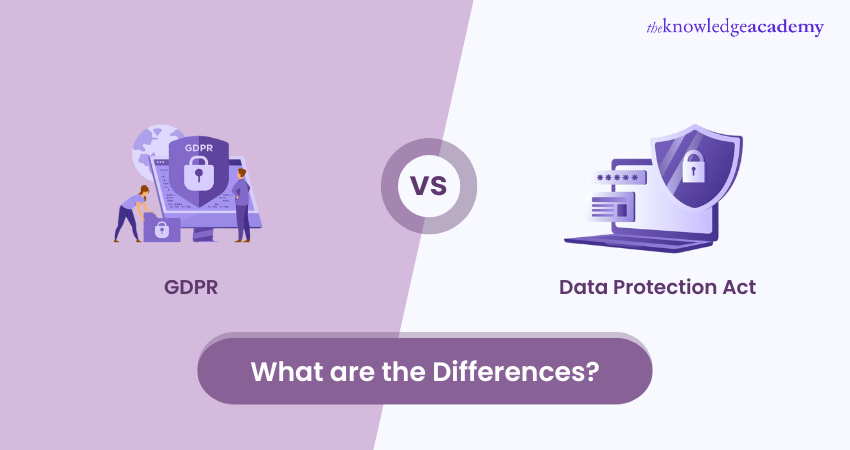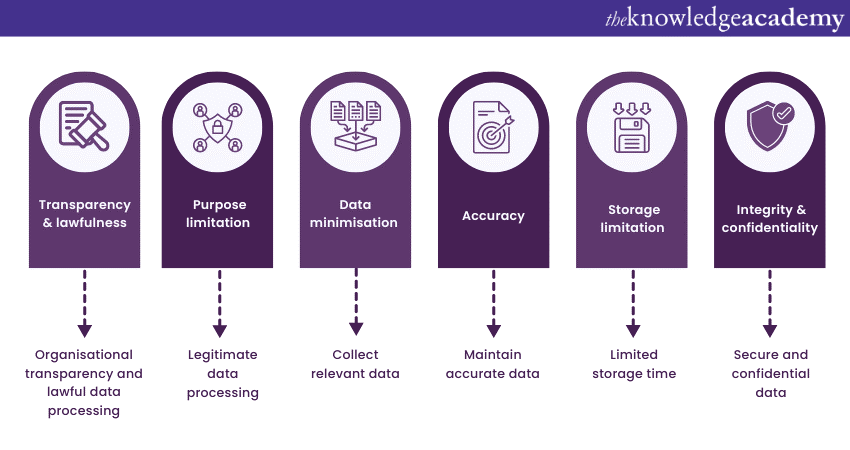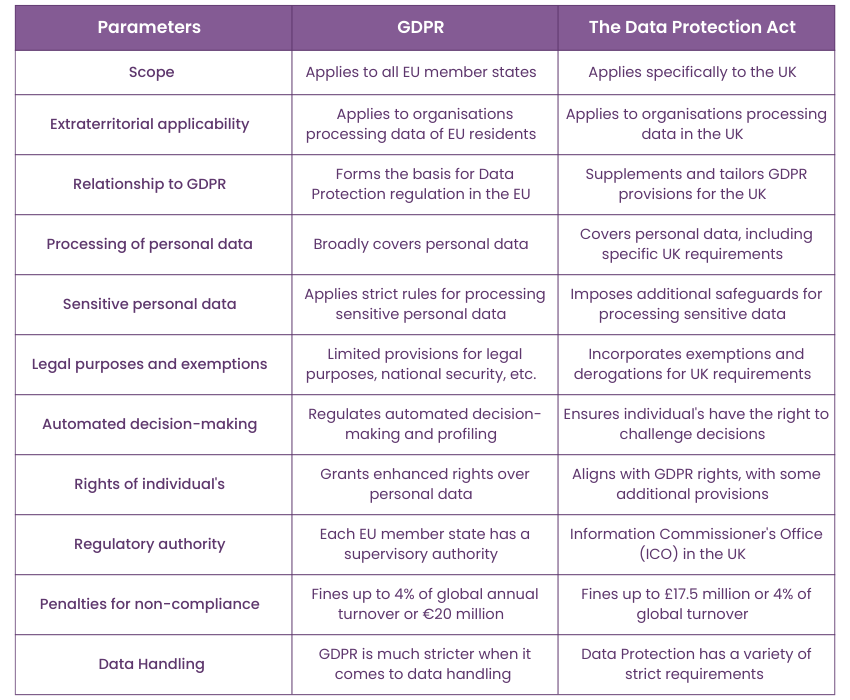We may not have the course you’re looking for. If you enquire or give us a call on +33 805638382 and speak to our training experts, we may still be able to help with your training requirements.
Training Outcomes Within Your Budget!
We ensure quality, budget-alignment, and timely delivery by our expert instructors.

Navigating data protection regulations can be challenging. With various laws in place, grasping the differences between key frameworks is essential. The Difference Between GDPR and the Data Protection Act often confuses businesses.
This blog clarifies the differences between GDPR and the Data Protection Act, outlining their similarities and impacts on organisations. Understanding these regulations will help ensure compliance and effective protection of customer data.
Table of Contents
1) Overview of GDPR
2) Overview of the Data Protection Act
3) Difference Between GDPR and Data Protection Act
4) What is the Importance of Data Protection?
5) What are the Data Protection Principles?
6) Conclusion
Overview of GDPR
The General Data Protection Regulation (GDPR) is a comprehensive privacy and data protection law that came into effect on 25th May 2018 across the European Union (EU). It was designed to address data privacy issues and give individuals more control over their personal data. The GDPR replaced the Data Protection Directive of 1995 and introduced significant changes to how organisations handle and process personal data.
One of the key Benefits of the GDPR is that it creates a consistent framework for data protection across all EU member states. It applies to any organisation that processes the personal data of individuals residing in the EU, regardless of the organisation’s location. This extraterritorial applicability ensures that individuals’ privacy rights are protected no matter where their data is processed.
The GDPR defines personal data as any information that relates to an identified or identifiable individual. This includes not only obvious data such as names, addresses, and identification numbers but also online identifiers like IP addresses and cookies. One of the Challenges of GDPR is managing the collection of various types of personal data, including names, addresses, identification numbers, and biometric or genetic data.
The GDPR introduces six fundamental principles that organisations must adhere to when processing personal data. These principles include:

Organisations are required to process personal data fairly and lawfully, and they must have a legitimate purpose for processing and collecting only the necessary data for that purpose.
Overview of the Data Protection Act
The GDPR Risk Assessment is part of the UK’s legislative framework governing the processing and protection of personal data. The current version, the Data Protection Act 2018, supplements and tailors the provisions of the European Union’s GDPR to fit the UK context. This act builds upon the foundations established by the GDPR and addresses specific UK requirements.
The Data Protection Act 2018 applies to organisations processing personal data in the UK. It covers a broad spectrum of personal data, including information related to identified or identifiable individuals. This encompasses not only basic personal details but also more sensitive data, such as health records, racial or ethnic origin, religious beliefs, and criminal records.
One of the key objectives of the Data Protection Act 2018 is to provide clarity and specificity regarding the processing of personal data for various purposes. The act includes provisions that supplement the GDPR by addressing areas not covered by the EU regulation. For instance, it incorporates exemptions and derogations to accommodate processing for legal purposes, national security, and law enforcement activities.
Additionally, the act includes extra safeguards and requirements related to the processing of sensitive personal data. It sets stricter conditions for processing such data, ensuring that individuals’ privacy is adequately protected. The Data Protection Act 2018 also regulates automated decision-making and profiling, ensuring that individuals are aware of and have the right to challenge decisions made by automated systems that significantly affect them.
Understand Data Protection and implement EU GDPR compliant initiatives by signing up for GDPR Courses now!
Difference Between GDPR and Data Protection Act
Below are the key differences between the GDPR and the Data Protection Act:

What is the Importance of Data Protection?
Data Protection is essential because it helps businesses to protect their customer's data and prevents it from being used for malicious purposes. Implementing strong Data Protection can help your clients feel secure and protected when using your services.
Businesses must remember that Data Protection is more than complying with the GDPR. It also protects your customers' data from being used for malicious purposes.
Increase Data Privacy awareness within your organisation by registering for our Data Privacy Awareness Course now!
What are the Data Protection principles?
The GDPR Principles are a set of guidelines that Explore the disparities between GDPR and the Data Protection Act, unravelling key distinctions in their scope and regulations. This blog delves into the intricacies while highlighting the fundamental GDPR Principles.
How Many Types of Data Protection Principles are There?
There are six Data Protection principles that businesses must comply with:
1) Any personal information should be handled justifiably and legally.
2) Personal information should only be collected for explicit and specific purposes that have been explicitly stated.
3) Personal data should be relevant and limited to what is necessary.
4) It is crucial for personal information to be precise and current. Any errors or outdated details could lead to potential issues or misunderstandings. Therefore, it is essential to ensure that personal data is always accurate and up-to-date.
5) It is imperative to ensure the confidentiality and security of personal data. Any spelling, grammar, or punctuation errors have been corrected.
6) It is crucial to ensure that personal data is not shared with unauthorised individual's or organisations. It is essential to maintain the confidentiality of personal information to prevent any potential harm or misuse.
Conclusion
The Differences Between GDPR and the Data Protection Act are crucial for understanding data protection regulations. GDPR provides a unified framework across the EU, focusing on sensitive personal data, while the Data Protection Act offers tailored guidelines. Organisations must conduct regular GDPR Audits to ensure compliance. By recognising these differences, organisations can manage personal data responsibly, enhancing trust and privacy in the digital environment.
Learn about the Data Protection, by signing up for the Data Protection Act (DPA 2018) Course now!
Frequently Asked Questions

How do the Principles of Data Processing Differ Between GDPR and the Data Protection Act?

GDPR imposes strict rules on international data transfers, requiring adequate protection measures. The Data Protection Act follows GDPR but includes specific provisions for data transfers from the UK, reflecting post-Brexit adjustments.

The Knowledge Academy takes global learning to new heights, offering over 30,000 online courses across 490+ locations in 220 countries. This expansive reach ensures accessibility and convenience for learners worldwide.
Alongside our diverse Online Course Catalogue, encompassing 19 major categories, we go the extra mile by providing a plethora of free educational Online Resources like News updates, Blogs, videos, webinars, and interview questions. Tailoring learning experiences further, professionals can maximise value with customisable Course Bundles of TKA.

The Knowledge Academy’s Knowledge Pass, a prepaid voucher, adds another layer of flexibility, allowing course bookings over a 12-month period. Join us on a journey where education knows no bounds.

The Knowledge Academy offers various GDPR Training, including the Certified EU General Data Protection Regulation (EU GDPR) Foundation and Practitioner Course, the EU General Data Protection Regulation Awareness Course and the Data Privacy Awareness Course. These courses cater to different skill levels, providing comprehensive insights into GDPR After Brexit.
Our IT Security & Data Protection Blogs cover a range of topics related to GDPR, offering valuable resources, best practices, and industry insights. Whether you are a beginner or looking to advance your Project Management skills, The Knowledge Academy's diverse courses and informative blogs have got you covered.
Upcoming IT Security & Data Protection Resources Batches & Dates
Date
 Certified Data Protection Officer (CDPO)
Certified Data Protection Officer (CDPO)
Thu 1st Jan 1970







 Top Rated Course
Top Rated Course



 If you wish to make any changes to your course, please
If you wish to make any changes to your course, please


